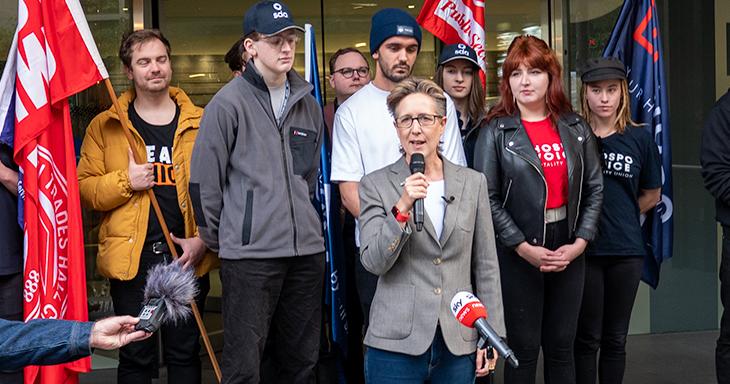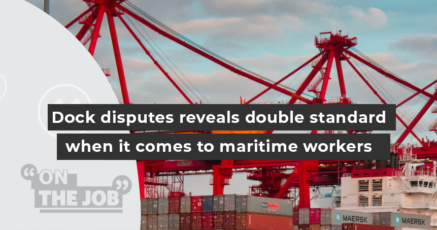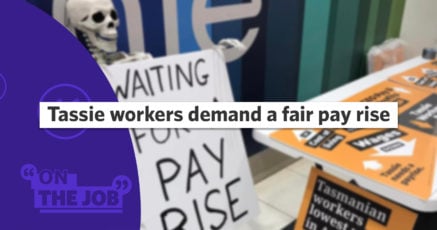Say one thing, do another. That is the modus operandi of the Morrison Government.
One Budget night a few weeks back, Treasurer Josh Frydenberg loudly boasted that “Team Australia is bouncing back.” Frydenberg had already consolidated his place as the king of wishful thinking after his 2019 proclamation that the budget was “back in the black” – it wasn’t.
Now the treasurer is at it again, with the sunny prediction of a rate of economic growth of 4.25 per cent and an unemployment number below 5 per cent.
How is all this supposed to happen? Why, a “population wide vaccination program” being in place by the end of 2021 would see to that. How’s all that working out then?
Oh, and workers would continue to keep the cash registers ringing, with domestic spending to be the engine room of the recovery, driving 60 per cent of economic activity.
OK, so to keep the spending chugging along, it would make sense for Frydenberg and his government colleagues to support a substantial wage rise for workers who have seen no real improvement in their pay for nearly a decade, wouldn’t it?
Say one thing, do another.
Last week, in its submission the Fair Work Commission’s Annual Wage Review, a government that was trumpeting Australia spending its way back to prosperity delivered its submission on the need for a rise in the minimum wage.
“Given the economic uncertainty, the Government maintains that the expert panel should adopt a cautious approach.”
In other words, a pay rise for our poorest paid workers? Meh.
Veteran economics journalist with The New Daily, Michael Pascoe, told On the Job the Government’s lack of genuine support for a rise in the minimum wage was compounded by a tax regime that traps lower paid workers in a poverty cycle.
“Tucked away in the back (of the Government’s submission) was a chart which shows just how miserable last year’s 1.75 per cent rise was,” he said.
“The chart took into account something that the Government never talks about…the impact of the tax and transfer system on whatever sort of wage rise you do get. That chart was the most important piece in the submission. It shows that last time around the minimum wage, in theory, went up by 1.5% or 13 bucks a week.
“But it didn’t mean someone on the minimum wage necessarily got an extra $13 a week. Someone who had no dependents, therefore only affected by tax, actually got $11 a week.
“But if you were a single income couple, with one person on the minimum wage, if they had a 3-year-old child, or indeed no children, they actually only got an extra $2 a week.
“So instead of a 1.75 per cent wage rise, they got 0.27 per cent.”
The confluence of low wages and the need for government assistance to supplement incomes is actually locking lower paid workers in an economic bind, according to Michael Pascoe.
“It is something the government doesn’t really want to acknowledge, it has this massive problem with people on low wages, if they have any government benefits whatsoever, or if they’re on partial job seeker, of losing so much money in the transfer system,” Pascoe explained.
“It’s a difficult problem, but it hits home in the real world.”

ACTU Secretary, Sally McManus, addressed a rally outside the Fair Work Commission in Melbourne last Wednesday. She underlined just how important a decent pay rise for minimum wage workers was to the health of the economy.
“Local businesses all around the country depend on essential, minimum wage workers getting a pay rise. Our whole economy depends on workers getting a pay rise.
“Australia needs a pay rise, yet we (the union movement) along with the ALP, are the only people in there at the moment arguing for a pay rise for the working people of our country.
“Not standing beside us are any of those businesses that did well during the pandemic, they’re arguing to keep wages low, to freeze wages all throughout this year.
“25 per cent of the working population depend on this pay rise. “
McManus pointed out that even the Reserve Bank can see that a substantial wage rise is needed to keep economic activity on track.
“The Reserve Bank Governor said that wages need to rise by over 3 per cent in order for economy to be healthy.
“And what are we doing? We’re arguing for 3.5 per cent.”
“It seems that working people are the only ones doing the heavy lifting to get wages rising.”













SHARE:
Frydenberg’s economic strategy – say one thing, do another.